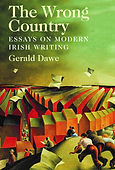GERALD DAWE
Prose & Translation

Gerald presents an accessible view of modern Irish literature, filtered perceptively through his own distinctive lens, and raises important questions about cultural belonging, the commercialisation of contemporary writing, and the influence of Irish literary culture in a digital age.

A unique trip through Belfast, mapped into the mystic through the timeless music of Van 'the Man' Morrison. The aptly soulful and inventive prose stems from the electric wit of acclaimed poet and fellow Belfast man, Gerald Dawe. Struck by the extraordinary brand of rhythm and blues that was Morrison's brainchild, Dawe's book is a celebration of the inspirations that underlie Morrison's music. Silhouetted in the work is a vibrant and moody Belfast; the formative influence of the pre-Troubles northern capital. Dawe's writing transmutes the tender and unforgettable strains of Morrison's work, from the release in 1968 of Astral Weeks'to the publication in 2014 of Lit Up Inside: Selected Lyrics. A powerful tribute to mark Van Morrison's accomplishments, In Another World taps into his legacy’s eclectic soul and is kin to its enchantments.

Earth Voices Whispering: An Anthology of Irish War Poetry [2008]
‘Gerald Dawe’s terrific book of Irish (anti-) war poetry’
Derek Mahon, The Irish Times
‘…this moving compendium… [a] challenging venture’
Cathal Dallat, Times Literary Supplement

The Visible World [2007]
Morgana Press Leipzig
A selection of Gerald Dawe's poetry translated into German, by Ni Gudix and published by Morgana Press Leipzig in 2007.

Gerald on the Cambridge Author Hub discusses the forthcoming publication of The Cambridge Companion to Irish Poets:
Watch the video here.

Among the refreshing features of the book are Dawe’s wide-ranging critical sensibility and poet’s instinct to read against the grain, to look for subtleties in tone and language that often get glossed over in ideological analyses. Luminaries like Yeats keep company with the lesser-knowns as Dawe takes a closer look at how Irish writers engaged with their “local” conflicts “in the context of wider European and emigrant contexts” – Jim Haughey, Breac (Keough-Institute for Irish Studies: University of Notre Dame.)

The Night Fountain:
Selected Early Poems of Salvatore Quasimodo (with Marco Sonzogni) [2008]
‘Delightful work, lively book. You catch the delicacy and hard – or, rather durance – in there. Worth doing and well done’, Seamus Heaney

The Proper Word [2007]
‘I read The Proper Word with admiration and respect - an unfakeable concern, a Clark Kent vision/inspection of the (con) fusion of word and world. It is fine and faithful to standards, to the extra-otherness of poetry; and wonderfully alert to and analytical of Ireland as she has been conducted/conducting herself for the past 30 or 40 years.’, Seamus Heaney
The Proper Word is a wonderful and perceptive collection. It's stunningly good
and beautifully produced., Mark Adair, BBC
‘One of the wonderful things about Gerald Dawe’s work, both as a poet and as a critic is that there’s a sense in everything he writes of a kind of precision, care and attention to detail which manages to be both extraordinarily honest, and extraordinarily precise in its relation to whatever object he’s writing about – whether he’s evoking it as a poet or whether he’s describing it as a critic. But at the same time, there’s that sense of honest engagement continually balanced by a broader perspective and sense of existing outside of sometimes what is the very fetid atmosphere of Irish literary and cultural debate. There’s no special pleading, there’s no sense of the setting out of either a broad or a narrow political agenda; what you find continually is that quality of engagement which is the same quality you find in the poet. It’s the quality of openness to the world.’ Fintan O'Toole
